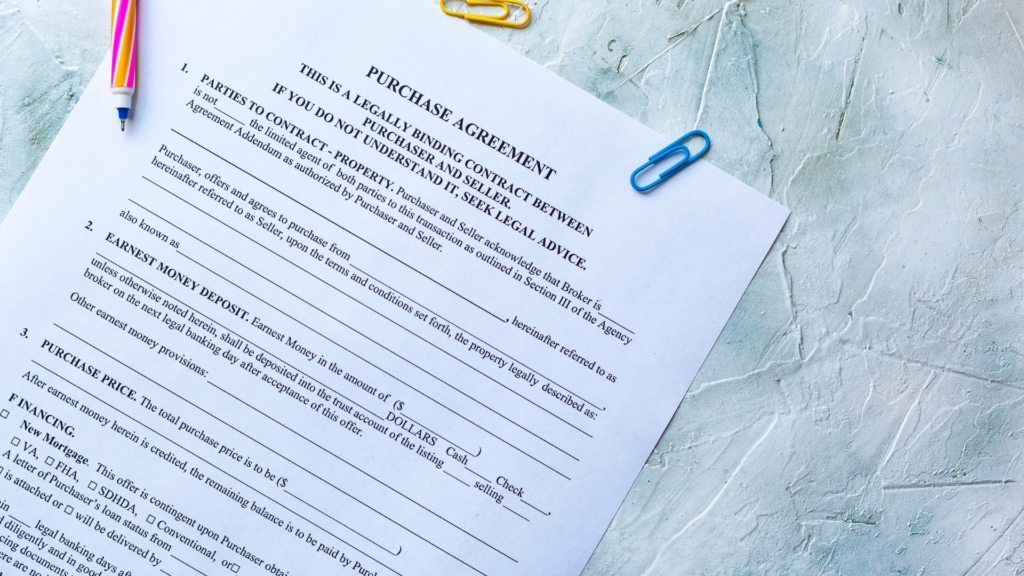Navigating the world of business transactions isn’t always a walk in the park. One critical document that often comes into play is the purchase agreement. It’s a legally binding contract between a buyer and a seller, outlining the terms of a business sale.
So, let’s get started on this journey to a smoother, more informed business transaction.
Purchase Agreement for Business
Aligning with the preceding narrative on purchase agreements agreement for business essence, this section takes it a notch deeper. The focus gets honed on familiarizing oneself with the inner workings of purchase agreement for businesses.
Key Components of a Purchase Agreement
 A purchase agreement for business, like any legal document, contains multiple parts or ‘components’ that work together to form a cohesive whole.
A purchase agreement for business, like any legal document, contains multiple parts or ‘components’ that work together to form a cohesive whole.
- Asset and Share Deals: This element identifies whether the agreement pertains to an asset or share deal.
- Purchase Price: The agreement states the agreed price for the business or its assets explicitly.
- Representations and Warranties: Here, the seller declares certain factual statements about the business. Instruments like ‘The company holds no outstanding legal issues’ represent such declarations.
- Indemnification: This clause establishes who bears risks such as lawsuits post-sale. For instance, despite the business being sold, some agreements might stipulate that the seller remains liable for any legal issues originating before the sale.
- Closing Conditions: These specify the conditions to meet before the business sale can be finalized. Examples — obtaining necessary approvals or third-party consents.
Preparing for the Purchase Agreement
A sound framework for a purchase agreement for business begins with preparation. One can’t rush this process. Thoroughness yields results essential for achieving business end-goals related to purchase agreements. This section delves into two facets of preparation: the due diligence process and establishing terms and conditions.
Due Diligence Process
Before executing a business purchase agreement, the due diligence process plays a crucial role. Essentially, it involves an in-depth investigation that allows potential buyers to evaluate a business entity before sealing the deal.
Establishing Terms and Conditions
 Establishing the terms and conditions in a purchase agreement remains as thorough a task as the due diligence process. Broadly, the terms and conditions elucidate the outline of the deal, specifically confirming what’s being bought or sold, besides stating the purchase price and payment terms.
Establishing the terms and conditions in a purchase agreement remains as thorough a task as the due diligence process. Broadly, the terms and conditions elucidate the outline of the deal, specifically confirming what’s being bought or sold, besides stating the purchase price and payment terms.
Optimal strategy application and adept negotiation lay the foundation for finalizing the purchase agreement for business. Several final steps take center stage as parties close in on the deal. Transition considerations happen after the sale concludes, while further understanding of these stages aids in successful business transactions.
Closing the Deal
Closing the deal implies ensuring that everything stated in the purchase agreement gets executed as specified. Both parties must meet all obligations before the final exchange of assets occurs.
Post-Sale Considerations
After the sale, several provisions keep the buyer and the seller bound. These provisions typically include non-compete agreements and consulting agreements. A non-compete agreement can restrict the seller from starting a similar business and would typically last one to two years, depending on negotiations.
Common Pitfalls to Avoid in Purchase Agreements
 Navigating purchase agreement for business, whether buying or selling a business, can be fraught with potential challenges. Two common issues are ambiguous contract language and a failure to plan for contingencies.
Navigating purchase agreement for business, whether buying or selling a business, can be fraught with potential challenges. Two common issues are ambiguous contract language and a failure to plan for contingencies.
One prevalent pitfall is ambiguities in contract language. Contractual vagueness or lack of specificity can lead to misunderstanding, breeds disputes, and cause agreement enforcement issues.
Another common pitfall in drafting purchase agreements is the failure to plan for contingencies. Unanticipated events or conditions may arise that could impact the agreement’s execution. Parties often neglect to include provisions addressing “what if” situations.
Must Know
Navigating the complexities of purchase agreements can be a daunting task. But with the right strategies, it’s possible to mitigate potential pitfalls and ensure a smooth transaction. It’s crucial to remember the importance of clear contract language and contingency planning. Ambiguities can lead to disputes, and without a plan for the unexpected, agreement execution can be disrupted.
